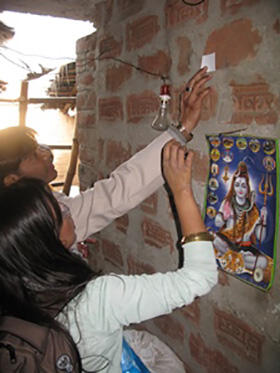
Quality assurance for indoor residual spraying (IRS) campaigns has been a major challenge for vector control programmes in India.
Until now the only method of monitoring the quality of IRS in India was an expensive and time consuming laboratory test. The process is complex and includes the placement of filter papers, attached pre IRS in houses and collection soon after spraying. The filter papers are then transported and analysed using expensive laboratory methods. It seemed like an ideal opportunity to develop a more cost effective and timely tool for quality assurance of IRS.
The Wellcome Trust is currently funding a project with the primary objective of making available a robust, low-cost insecticide quantification kit (IQK) for detecting the presence of insecticide on sprayed surfaces. IRS is currently the key vector control intervention to interrupt visceral leishmaniasis (VL) transmission in India.
Visceral leishmaniasis is a potentially fatal disease transmitted by the bite of a sandfly, Phlebotomus argentipes. Approximately 200 million people on the Indian subcontinent are at risk from VL, with the majority of reported VL cases occurring in Bihar state.
Studies have proved that IRS has had a significant impact on VL cases, especially during the earlier efforts where IRS was the focal intervention to eradicate malaria. With this in mind IRS programmes strive to implement effective campaigns across Bihar and other endemic areas. Effective, post-spray quality assurance of IRS is a critical component to achieve this goal.
In February 2014, members of LSTM staff travelled to Bihar to combine forces with the Rajendra Memorial Research Institute (RMRI) in preparation for an initial assessment of the IQKs under field conditions. During the assessment the IQK’s performance will be compared with the current method of IRS quality assurance testing, High Performance Liquid Chromatography (HPLC), carried out in the lab. The aim of this initial field assessment is to confirm that the IQKs are a practical and cost effective alternative tool for IRS quality assurance that compares well with the current gold standard for IRS quality assurance.
In parallel with the Wellcome Trust project another , funded by the Bill and Melinda Gates Foundation, is underway in Bihar state. The project aims to support vector control intervention efforts within Bihar and other VL endemic areas. LSTM staff will be working in support of both projects, enabling data from one to feed into and inform the other.
Project Manager, Marlize Coleman, said: “The ultimate aim of these projects is to improve the quality of IRS by providing improved quality assurance and decision support tools, thus significantly reduce levels of VL to a point where elimination is a reality.”